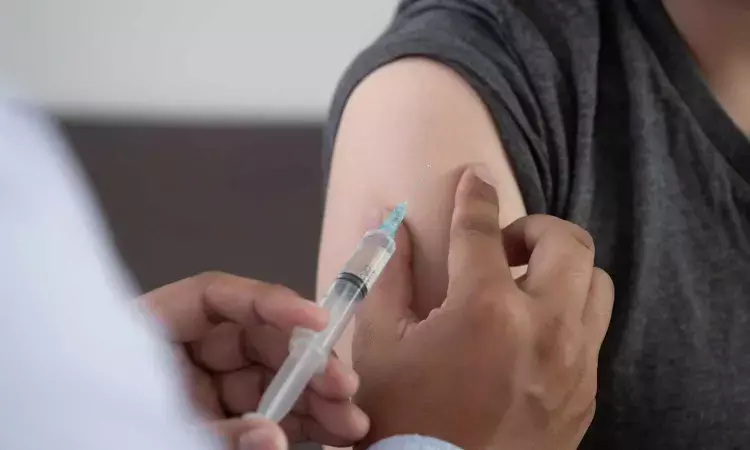- Home
- Medical news & Guidelines
- Anesthesiology
- Cardiology and CTVS
- Critical Care
- Dentistry
- Dermatology
- Diabetes and Endocrinology
- ENT
- Gastroenterology
- Medicine
- Nephrology
- Neurology
- Obstretics-Gynaecology
- Oncology
- Ophthalmology
- Orthopaedics
- Pediatrics-Neonatology
- Psychiatry
- Pulmonology
- Radiology
- Surgery
- Urology
- Laboratory Medicine
- Diet
- Nursing
- Paramedical
- Physiotherapy
- Health news
- Fact Check
- Bone Health Fact Check
- Brain Health Fact Check
- Cancer Related Fact Check
- Child Care Fact Check
- Dental and oral health fact check
- Diabetes and metabolic health fact check
- Diet and Nutrition Fact Check
- Eye and ENT Care Fact Check
- Fitness fact check
- Gut health fact check
- Heart health fact check
- Kidney health fact check
- Medical education fact check
- Men's health fact check
- Respiratory fact check
- Skin and hair care fact check
- Vaccine and Immunization fact check
- Women's health fact check
- AYUSH
- State News
- Andaman and Nicobar Islands
- Andhra Pradesh
- Arunachal Pradesh
- Assam
- Bihar
- Chandigarh
- Chattisgarh
- Dadra and Nagar Haveli
- Daman and Diu
- Delhi
- Goa
- Gujarat
- Haryana
- Himachal Pradesh
- Jammu & Kashmir
- Jharkhand
- Karnataka
- Kerala
- Ladakh
- Lakshadweep
- Madhya Pradesh
- Maharashtra
- Manipur
- Meghalaya
- Mizoram
- Nagaland
- Odisha
- Puducherry
- Punjab
- Rajasthan
- Sikkim
- Tamil Nadu
- Telangana
- Tripura
- Uttar Pradesh
- Uttrakhand
- West Bengal
- Medical Education
- Industry
Study Affirms Safety: First-Trimester mRNA COVID-19 Vaccination Shows No Link to Structural Birth Defects

USA: Recent research examining the safety of COVID-19 vaccination during the first trimester of pregnancy has provided reassuring findings regarding the absence of association with major structural birth defects among live births. The study, published in JAMA Pediatrics, addressed concerns and clarified the potential risks of early pregnancy vaccination.
In the multisite cohort study, the researchers found no association between first-trimester mRNA COVID-19 vaccine exposure and an increased risk for selected major structural birth defects among live-born infants.
The results affirm the safety of administering COVID-19 vaccines to pregnant women during their first trimester.
Throughout pregnancy, COVID-19 vaccination is recommended to prevent pregnancy complications and adverse birth outcomes linked with COVID-19 disease. Data on birth defects following vaccination during the first trimester are scarce. To fill this knowledge gap, Elyse O. Kharbanda, HealthPartners Institute, Minneapolis, Minnesota, and colleagues aimed to evaluate the associated risks for selected major structural birth defects among live-born infants after first-trimester receipt of a messenger RNA (mRNA) COVID-19 vaccine.
For this purpose, the research team conducted a retrospective cohort study of singleton pregnancies with estimated last menstrual period (LMP) between 2020 and 2021 and ending in live births from 2021 to 2022. They included data from 8 health systems in Oregon, California, Colorado, Washington, Minnesota, and Wisconsin in the Vaccine Safety Datalink.
The exposures include receiving 1 or 2 doses of mRNA COVID-19 vaccine during the first trimester as part of the primary vaccination series.
Certain significant structural birth anomalies in live-born infants were identified through electronic health records using validated algorithms, with neural tube defects specifically verified through medical record examination.
The study led to the following findings:
- Among 42 156 eligible pregnancies (mean maternal age, 30.9 years), 18.1% received an mRNA COVID-19 vaccine in the first trimester. Of 34 524 pregnancies without a first-trimester COVID-19 vaccination, 5.9% were vaccinated before pregnancy, 39.1% during the second or third trimester, and 55.0% were unvaccinated before or during pregnancy.
- Compared with pregnant people unvaccinated in the first trimester, those vaccinated in the first trimester were older (mean age, 32.3 years vs 30.6 years) and differed by LMP date.
- After applying stabilized inverse probability weighting, differences in baseline characteristics between vaccinated and unvaccinated pregnant persons in the first trimester were negligible.
- Selected major structural birth defects occurred in 1.48% of infants after first-trimester mRNA COVID-19 vaccination and 1.41% of infants without first-trimester vaccine exposure; the adjusted prevalence ratio was 1.02.
- There were no significant differences between infants vaccinated or unvaccinated in the first trimester in secondary analyses, with major structural birth defect outcomes grouped by organ system.
"First-trimester mRNA COVID-19 vaccine exposure was not associated with an increased risk for selected major structural birth defects among live-born infants," the researchers wrote.
Reference:
Kharbanda EO, DeSilva MB, Lipkind HS, et al. COVID-19 Vaccination in the First Trimester and Major Structural Birth Defects Among Live Births. JAMA Pediatr. Published online July 01, 2024. doi:10.1001/jamapediatrics.2024.1917
Dr Kamal Kant Kohli-MBBS, DTCD- a chest specialist with more than 30 years of practice and a flair for writing clinical articles, Dr Kamal Kant Kohli joined Medical Dialogues as a Chief Editor of Medical News. Besides writing articles, as an editor, he proofreads and verifies all the medical content published on Medical Dialogues including those coming from journals, studies,medical conferences,guidelines etc. Email: drkohli@medicaldialogues.in. Contact no. 011-43720751


